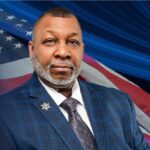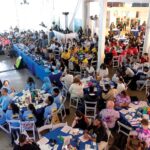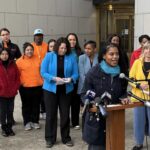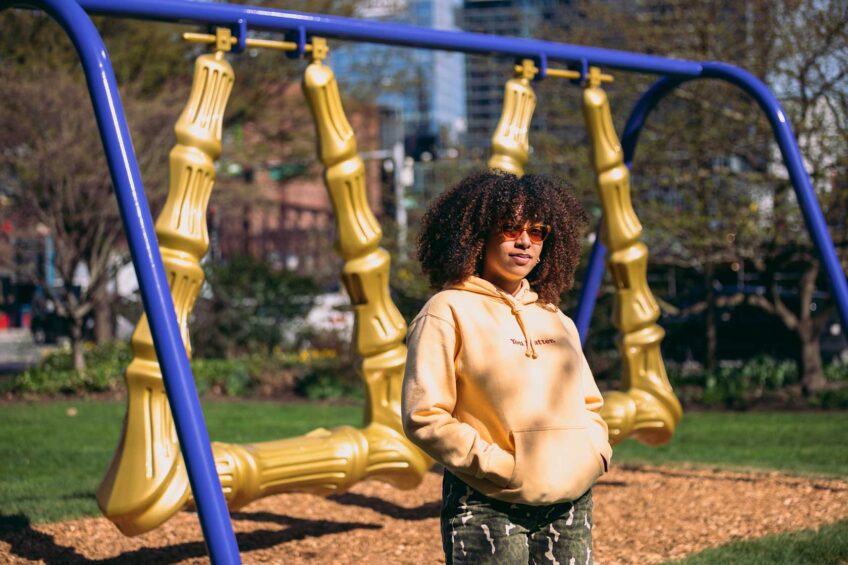
Banner Arts & Culture Sponsored by Cruz Companies
Whenever Francesca McNeely heard “Wade in the Water” as a young girl, she simply thought the African American spiritual was an upbeat song. It’s an easy mistake to make, she said.
“If you don’t actually know the meaning behind the songs, sometimes they just sound like beautiful tunes, right?” said McNeely, a cellist and member of A Far Cry, a Boston-based collaborative chamber orchestra. “You might not realize … the deeper, darker message,” she added.
In the case of “Wade in the Water,” the message is about “instructing people to go hide in the water so the dogs that are chasing you can’t smell you anymore” which is “really dark,” she said.
But the genius of spirituals lies in how they were composed.
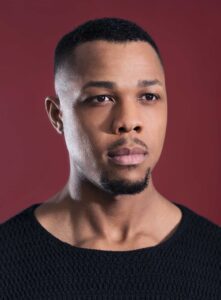
Opera singer Davóne Tines partners with chamber orchestra A Far Cry to explore the legacy of African American spirituals in “CODED” at Jordan Hall, Oct. 11. PHOTO: BOWIE VERSCHUUREN
“Because it’s been coded in this sort of typical upbeat fashion, you could sing it in more public places without drawing attention to the origin of it … so I think there’s a bit of that layered in, too,” McNeely said. “The fact that these songs had to be encoded in a way in order to be transmitted to people for help was sort of a part of why they existed in the first place.”
This notion of embedding meaning into music is the crux of “CODED,” a concert from A Far Cry to be held Oct. 11 at the New England Conservatory’s Jordan Hall. In collaboration with opera singer Davóne Tines, A Far Cry will offer up a night that honors the legacy of African American spirituals, including a rendition of Frederick Tillis’ “Wade in the Water” arranged by McNeely and novel music from award-winning composer Tyshawn Sorey.
The program also highlights the works of Harry T. Burleigh, who composed African American music classically, and his relationship with Czech composer Antonín Dvorák, who was influenced by African American music.
Sarah Darling, a violinist and member of A Far Cry, said “String Quartet No. 12,” a well-known piece by Dvorák, would not exist had it not been for his relationship with Burleigh. And for Burleigh’s part, when he began rearranging African American spirituals with piano accompaniments, thus changing them to suit a classical audience, the songs were “given entrance” into classical music environments and celebrated, she said.
“The question I think that’s playing with was this idea of … what do these songs become when you dress them up in this way?” Darling said. She added, “What remains? What is lost?”
The name “CODED” came to be as violinist Megumi Stohs Lewis, Darling and Tines thought about code-switching, the act of shifting one’s language — tone, vocabulary — to match the audience. The idea, said Tines, comes from W.E.B. Du Bois’ concept of double consciousness from “The Souls of Black Folk,” in which he outlines the experience of most people of color or minorities.
“The music allows us an opportunity to feel that, and to maybe even cause empathy through the act of feeling what this complication or this layering might actually be,” Tines said. He added, “W.E.B. Du Bois put it into words, and we’re essentially trying to put it into music.”
The concert will offer different perspectives on spirituals, honoring their origins while asking how they might be done differently today, contrasting the “modern lens” with the “root,” Tines said. He leaned into this push and pull because he wanted to make the audience feel comfortable first, by presenting what they might be familiar with, before dropping the floor beneath them “so they feel something new or different,” he said.
Stohs Lewis said the concept for the concert was also inspired by “growing up in America and hearing spirituals or the musical traditions that have been influenced by spirituals, whether it’s in church or in classical music” and realizing “just how widespread it is in the fabric of American music.”
The A Far Cry team wants the concert to be a “wonderful sonic experience,” she said, that will also shift audience members’ mindsets.
“I’m hoping that people will open themselves up to new perspectives, like hearing something in a new context,” Stohs Lewis said. “And I’m hoping that they will [be thinking about] their own experiences and also thinking about the experiences of others around them.”

